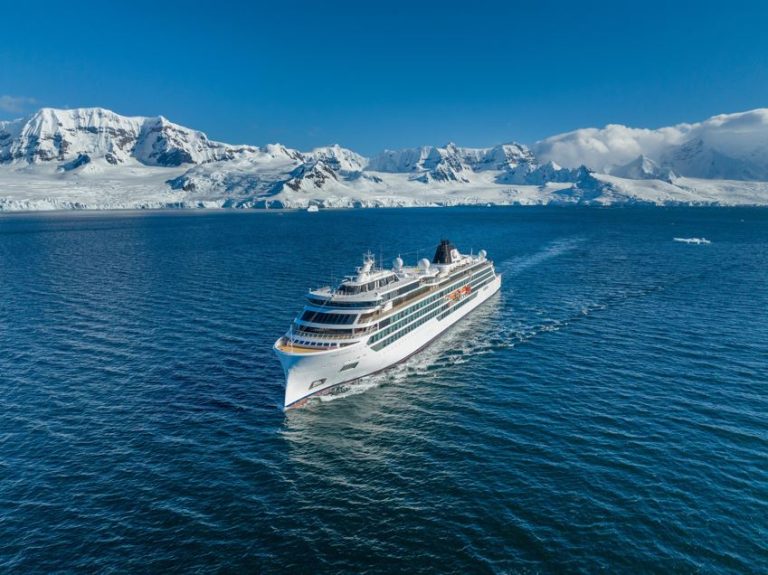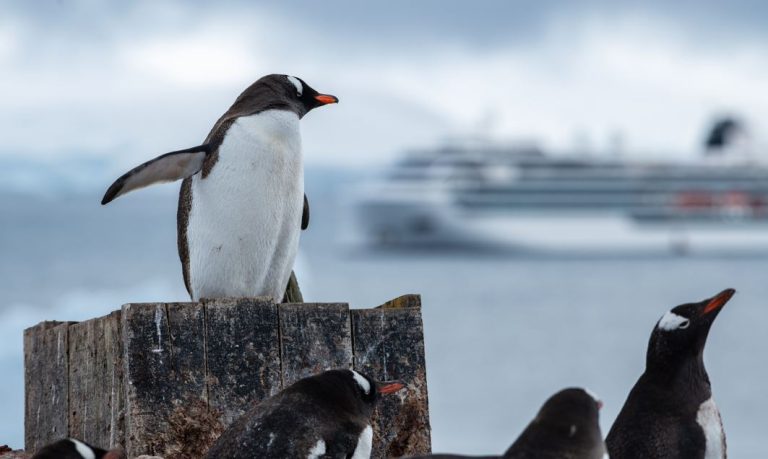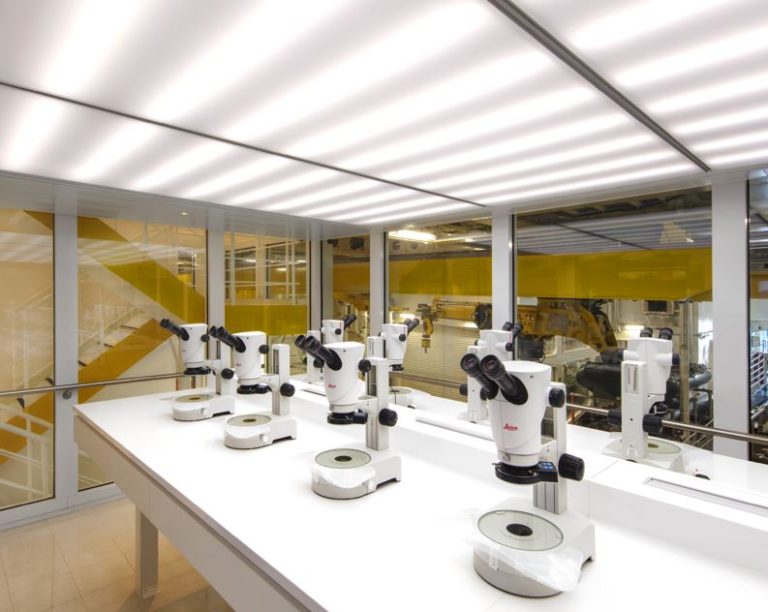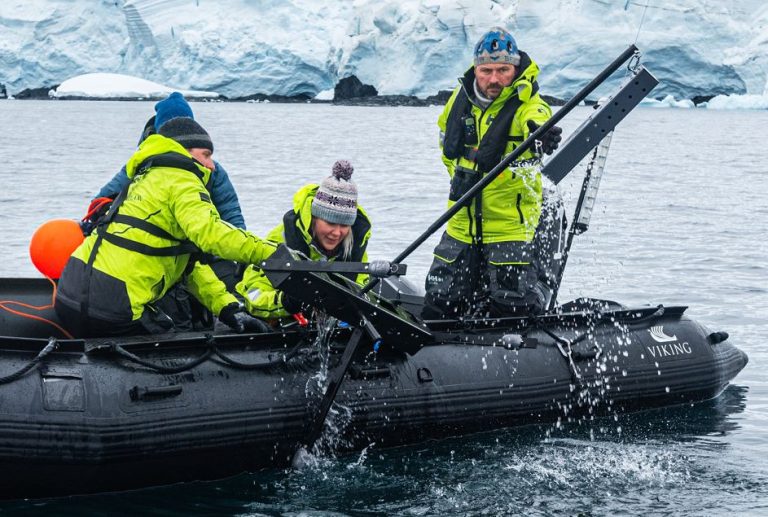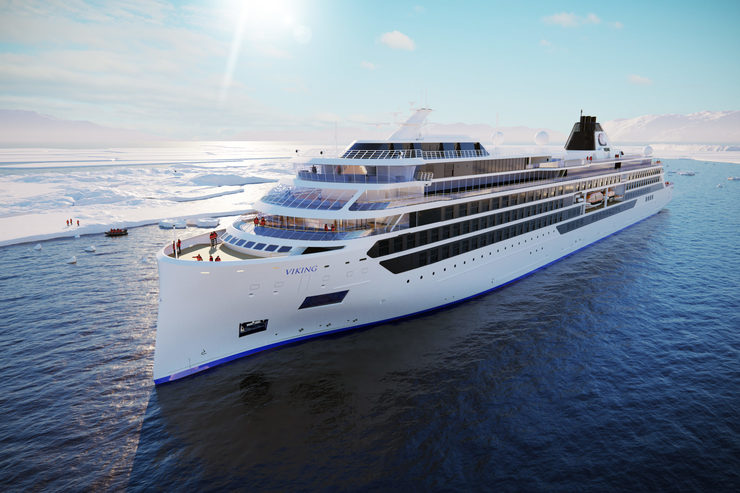Viking: Phytoplankton Sequencing at Sea
Viking, with the scientific support of UC San Diego’s Scripps Institution of Oceanography and the J. Craig Venter Institute (JCVI), has made a scientific advancement on board its expedition fleet by sequencing environmental DNA (eDNA) of phytoplankton in real-time.
The PCR lab on board the Viking Octantis has been converted into an advanced scientific environment where guest researchers contributing to the Genomics at Sea Program (GASP) can monitor the environmental impact on phytoplankton without needing to transport samples to a distant shoreside facility. This marks a significant milestone in marine research and exploration, as Viking becomes the first travel company to support real-time environmental genetic sequencing capabilities on board its vessels.
Viking Octantis
This achievement underscores Viking’s commitment to ensuring that every expedition voyage offers opportunities for meaningful scientific research and discovery. The onboard advancements and participation in GASP are an extension of Viking’s role in collaborating with Fjord Phyto, a NASA-funded program by Scripps, which enables guests to participate in research and public education through sampling polar phytoplankton for genetic population analyses.Viking believes that its responsibility extends beyond providing exceptional travel experiences. From the outset, the company has been deliberately concerned about the environment, making decisions it believes are scientifically correct rather than politically correct. Viking’s fleet boasts many environmentally friendly features, such as diesel-electric river ships and energy-efficient ocean vessels equipped with closed-loop exhaust scrubbers.
The conversion of the PCR lab on board the Viking Octantis took place earlier this year while the ship was in Antarctica. Viking will regularly host Scripps scientists on board the ship this season, and during the summer, the PCR lab on Viking Polaris will also be transformed to further support research efforts.
The company has succeeded in creating a world-leading scientific enrichment environment in an expedition setting thanks to partnerships with esteemed academic institutions. During each expedition, guest researchers from partner institutions are part of the multidisciplinary 36-person expedition team, which guides guests through meaningful scientific research, providing information during shore excursions and onboard through world-class lectures. The Scripps Institution of Oceanography works to understand environmental challenges, while JCVI’s mission is to advance the science of genomics to better understand the biological world.
Viking Antarctica Gentoo
Viking Octantis Laboratory
Andrew Allen, a professor of marine biology at Scripps and JCVI, emphasized that this work will provide a new and more comprehensive view of the genetic diversity of plankton, allowing for advances in assessing the biological response of the oceans to climate change and other stressors.
In addition to the Scripps Institution of Oceanography, UC San Diego, Viking’s other scientific partners include:
– Scott Polar Research Institute (SPRI) at the University of Cambridge: SPRI scientists conduct fieldwork aboard Viking’s expedition ships and join voyages to share their expertise with guests. SPRI has played a significant role in developing the scientific enrichment program for Viking Expeditions. Specialists from the Institute were also consulted in the development of the Science Lab on Viking’s expedition vessels, which is equipped with wet and dry laboratory facilities to support a broad range of research.
– Cornell Lab of Ornithology: Ornithologists regularly board Viking’s expedition vessels, conducting post-doctoral research on new observation methods and providing guest advice and interaction.
– National Oceanic and Atmospheric Administration (NOAA) Great Lakes Environmental Research Laboratory (GLERL): Conducts innovative research on the dynamic environments and ecosystems of the Great Lakes and coastal regions to provide information for resource use and management decisions that lead to safe and sustainable ecosystems, ecosystem services, and human communities. Viking’s expedition ships have been designated official NOAA / US National Weather Service weather balloon stations, from which regular launches are undertaken.
– Norwegian Institute of Water Research (NIVA): NIVA scientists are engaged in cross-disciplinary research programs on water-related issues. Viking’s expedition ships are equipped with NIVA’s “FerryBox” system of automated oceanographic instruments to sample the marine and freshwater regions where the vessels sail, providing continuous information on chlorophyll, oxygen, temperature, salinity, microplastic presence, and complementary meteorological data.
– Oceanites: An American non-profit field research entity that has led Antarctic penguin monitoring for the past thirty years.
– IUCN Species Survival Commission Species Monitoring Specialist Group: Viking coordinates with this international group of experts to develop marine biodiversity monitoring systems that enable Viking expedition vessels to collect valuable species population data.
– Norwegian Polar Institute: The permitting authority for Viking’s Norwegian-flagged expedition vessels, which reviews and approves all of Viking’s expedition and scientific activities in Antarctica.
Viking Zodiac
With a clear focus on the environment and scientific research, Viking is dedicated to offering travel experiences that go beyond mere cruising, involving guests in an important mission for not only the cruise industry but the entire planet. Additionally, Viking is working to make its next generation of ocean ships even more environmentally friendly, with a project for a partial hybrid propulsion system using liquid hydrogen and fuel cells, which could allow for zero-emission operations while in port and traveling at low speeds.
Don’t miss Viking Cruises news, updates and reviews on Cruising Journal with photos, videos and cruises on offer.

